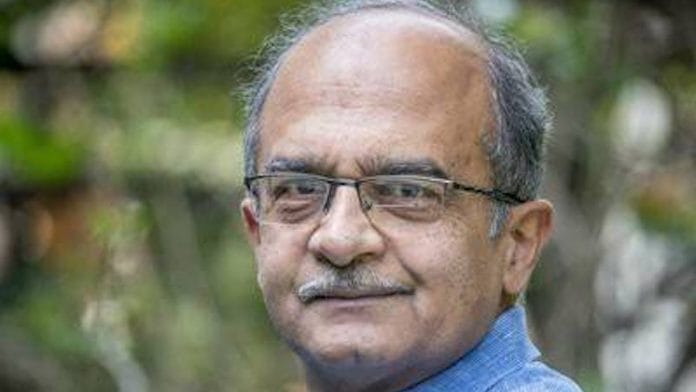New Delhi: The Supreme Court Monday fined lawyer-activist Prashant Bhushan Re 1 in the contempt of court case against him, ruling that it has taken his conduct into consideration.
The court, however, ruled that Bhushan will have to deposit the money by 15 September, failing which he will have to undergo a sentence of three months and will be debarred from practice for three years.
Reading out its verdict, the bench headed by Justice Arun Mishra said it had considered “the sane advice given by the Attorney General and concluded that the conduct of present contemnor also needs to be taken into consideration”.
The court also noted that it had given an opportunity, directly and indirectly, to persuade the contemnor to express regret.
“But it was not heeded to by the contemnor and he gave wide publicity to his statements,” Justice Mishra said. “Bhushan’s statements to the press even before they were considered by this court was to influence proceedings. Courts cannot go by opinions published in the media.”
The court further noted that everyone does have the freedom of expression but at the same time must respect the rights of others.
The court also said an in-house procedure should be adopted for complaints of corruption against judges, adding that the judges press conference in 2018 was wrong.
The contempt case
The court had initiated contempt proceedings against Bhushan on 21 July for his tweets on Chief Justice of India (CJI) S.A. Bobde and former CJIs. In one of his tweets, Bhushan had commented on a photo of CJI Bobde astride a Harley Davidson bike. In the other, he had criticised the incumbent and past CJIs.
Bhushan had then filed a 132-page affidavit defending his tweets. In his affidavit, he had explained the context in which he had put out the two tweets in July, and claimed that the judiciary as an institution had collapsed and become an extension of the executive.
The court, however, found him guilty of criminal contempt on 14 August, and noted that not dealing firmly with malicious attacks against the judiciary “may affect the national honour and prestige in the comity of nations”.
It had then posted the matter for 20 August, for hearing arguments on the punishment, which can go up to a maximum of six months in jail. On 20 August, however, the court gave him time until 24 August to tender an unconditional apology.
The 20 August hearing also saw Attorney General K.K. Venugopal, who was not attending in his capacity as lawyer for the government, urging the bench not to punish Prashant Bhushan. While Venugopal did not defend him for his tweets, the top law officer endorsed the court’s decision to give more time to Bhushan to reconsider his statement.
“I have known him for so many years. He has done tremendous work,” Venugopal had said.
Also read: What is an apology? Prashant Bhushan’s contempt case reveals true meaning of the word
‘Insincere apology will be contempt of conscience’
Bhushan, however, filed a fresh statement in the Supreme Court on 24 August, refusing to apologise.
“An apology cannot be a mere incantation and any apology has to, as the court has itself put it, be sincerely made. This is especially so when I have made the statements bonafide and pleaded truths with full details, which have not been dealt with by the Court,” his statement said.
“If I retract a statement before this court that I otherwise believe to be true or offer an insincere apology, that in my eyes would amount to the contempt of my conscience and of an institution that I hold in highest esteem,” it added.
Bhushan’s statement also said that while he has the “highest regard for the institution of the Supreme Court”, he had expressed himself “in good faith, not to malign the Supreme Court or any particular Chief Justice, but to offer constructive criticism so that the court can arrest any drift away from its long-standing role as a guardian of the Constitution and custodian of peoples’ rights”.
After this statement was filed, the case was heard again on 25 August, to consider Bhushan’s statement. During this hearing, Venugopal reiterated that Bhushan should not be punished, but he must express “regret” and withdraw his 132-page affidavit that he had earlier filed.
The court had then reserved its verdict on the sentence that should be imposed on him.
Also read: Unity is not conformity — India should know that as Prashant Bhushan is convicted for contempt







Darpok prashant bhushan ! What happened to his conscience? He paid the fine to escape jail and debar. Next time he criticizes judges as a second time offence, he will be in jail !0
Satisfying judgement.
Can the SC legally take away the right to earn livelihood from any person? Can this judgement stand critical legal scrutiny, from someone willing to honestly do the exercise? Sept2 is a good day for the SC.
There is no symmetry or proportion between a fine of one rupee or three months of imprisonment and debarment from practice for three years, in default. It is the latter punishment which the honourable apex court actually felt was merited. The token fine is a face saver, draws a curtain over proceedings which many eminent people feel ought not to have been initiated. This case becomes part of institutional memory, a guide for the future.
Someone blinked.
WHAT WILL MAHATMA MANDELA DO ?